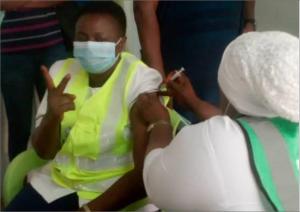My vaccination experiences-recipients speak after receiving COVID-19 vaccine
Abuja, 31 March 2021 - “Nine days after receiving the Oxford-AstraZeneca COVID-19 vaccine, I am yet to experience any negative side effect and I was among the first set of health workers in Nigeria who received the vaccine. The vaccine is safe as I have not felt any different or ill”, says Mary Yarda, a Nursing officer at the National Hospital, Abuja.
For Nurse Yarda, receiving the vaccine is mind-settling working in an environment that makes health workers susceptible to contracting the virus.
On 05 March 2021, Nigeria kick-started the vaccination drive for frontline health workers at the National Hospital Abuja, with the doses of the Oxford-AstraZeneca COVID-19 vaccine manufactured by the Serum Institutes of India from Mumbai shipped into the country on 02 March, 2021 via the COVAX Facility, a partnership between CEPI, Gavi, UNICEF and World Health Organisation (WHO).
“I had no doubt about receiving the vaccine. In fact, I was looking forward to when the vaccine was going to get to the country, and the government would start administering it. The only experience I had after taking the vaccine was the heaviness of the hand, but that is common with most vaccines. The scary part of the pandemic before taking the vaccine was going home and potentially exposing my family to the virus.
“Anytime I close from work, I always went home with prayers of not exposing my family to the virus. I live in a fenced apartment, so I pull my clothes and shoes outside and head straight for the bathroom before having any interaction with my family. It was not easy, but I knew it was something I had to do to protect them, so this [the vaccine rollout] is very exciting, she said.
More endorsements by recipients
Nigeria was allocated 3.94 million doses of Oxford-AstraZeneca COVID-19 vaccine from COVAX facility to cover health workers and other vulnerable groups with more arrivals expected in the coming weeks as part of an unprecedented effort to deliver at least 2 billion doses of COVID-19 vaccines worldwide by the end of 2021.
Nigeria has since deployed the vaccine and, initiated vaccination across the country.
For Chioma Sandra Nwoga, nursing officer II with the National Hospital Abuja, receiving the vaccine was not much of a tough decision. Although she was not part of the first people who took the vaccine, she decided to take the jab because the COVID-19 pandemic had not only affected her social life and interaction with her family and colleagues. Also, she has seen people infected and died of the virus.
“The jab was not as painful as I thought it would be. However, immediately after I took the vaccine, I started sweating, had some numbness as if I had just finished an exercise and heaviness in the arm where I took the vaccine. I also had a slight headache. Aside from that, I have been fine. All these reactions are common when you take other vaccines too. If taking the vaccine means I can get home and not be scared of hugging my two years old son, then I knew I had to take it. My neighbours have stopped coming to my home or playing with my children because I am a nurse. They are scared of contracting the disease through them. I did this for them, she said.
Also, Audu Caroline, the Chief Nursing Officer in charge of the Staff Clinic, Family Medicine, National Hospital, Abuja, appreciated the government for administering the vaccine to frontline health workers across the country, saying it would stem the level of infections among the workforce.
Nurse Audu had received the vaccine alongside the first set of health workers in Abuja.
“I only had pain in my hands the second day and after taking a pain killer, I got better. There are lots of misinformation about the vaccine, even among health workers, but I can tell you it is not true because I have taken the vaccine. The vaccine is safe. I have been advising my colleagues to summon the courage and take the vaccine and not to stop observing the precautionary measures despite taking the vaccine”, she said.
Hope in the horizon
However, being vaccinated does not mean that people can throw caution to the wind and put themselves and others at risk.
To buttress this point, Dr Walter Kazadi Mulombo, the WHO Nigeria Country Representative (WR), said “vaccine is a powerful tool, but it is an additional tool. Nigerians need to continue adhering to other public health and social measures. People need to continue to wear face masks in public, avoid confined places, continue to wash their hands or use hand sanitizers, maintain physical distancing and other measures”.
COVAX is co-led by Gavi, the Vaccine Alliance, the World Health Organization (WHO) and the Coalition for Epidemic Preparedness Innovations (CEPI), working in partnership with UNICEF, the World Bank, civil society organizations, manufacturers, and others.
COVAX is part of the Access to COVID-19 Tools (ACT) Accelerator, a ground-breaking global collaboration to accelerate development, production, and equitable access to COVID-19 tests, treatments, and vaccines.
Technical Contacts:
Dr JEAN BAPTISTE, Anne Eudes. Email: jeana [at] who.int (jeana[at]who[dot]int); Tel: +234 813 173 6281



